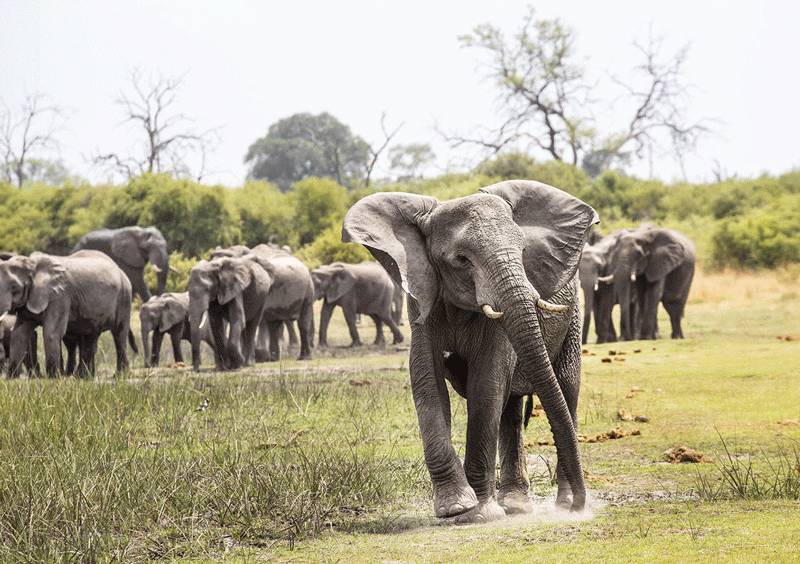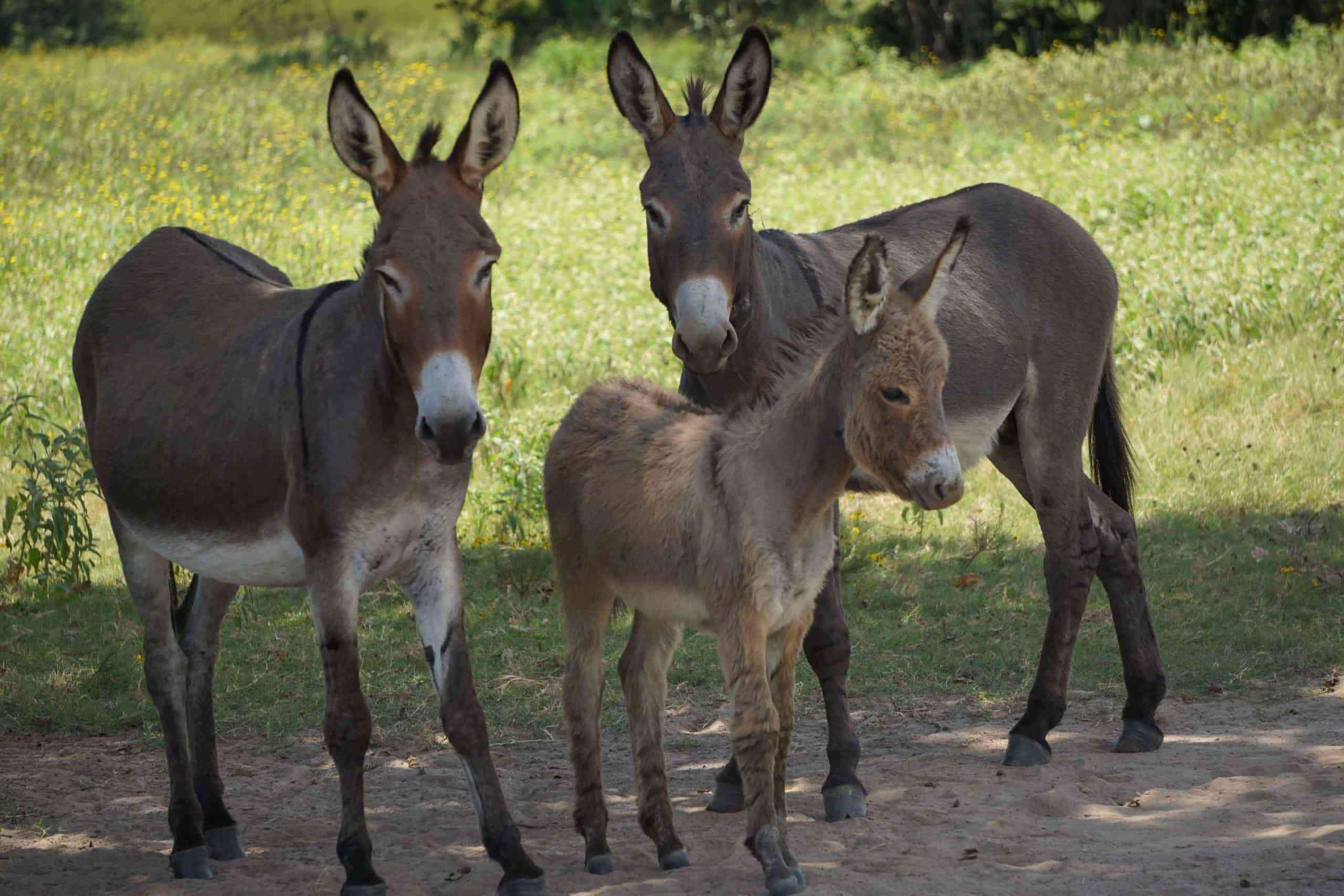
A number of villagers in Bulilima, Matabeleland South have been forced to flee their homes fearing attacks by elephants that have invaded their communities searching for food and water.
For months now, Plumtree town and its surrounding villages have been under siege from herds of elephants coming from neighbouring Botswana, driven by drought that has devastated their natural habitats.
With water sources drying up and food becoming scarce, the elephants have encroached into human settlements, creating a climate of fear and panic.
In villages such as Tokwana, just outside Plumtree, families have started abandoning their homes, seeking refuge elsewhere.
In recent weeks, the elephants have been spotted close to Plumtree town where they drink from any available water source including Maninji Dam and even sewage ponds.
Entire plots have been laid to waste as the elephants tear down fences, uproot large trees, and trample crops.
Even the local prison farm has not been spared after the elephants invaded it and destroyed crops.
Residents called on authorities to drive away the jumbos to designated game parks to arrest the growing human-wildlife conflict in their area.
- Art helps Plumtree kids thrive
- Zimbabwean CE named among global leaders
- Mangwe farmers benefit from agric projects
- Art helps Plumtree kids thrive
Keep Reading
A villager from Tokwana, Gogo Mandazi, said the jumbos have made their life a nightmare.
“We have no choice but to leave our homes to find a safer environment in neighbouring wards,” Mandazi said.
“We are constantly living in fear, especially for our children who have to go to school.
“It’s terrifying knowing that a child could run into a herd on their way to school.
“We can’t keep living like this. “
A Plumtree resident, Collen Ndlovu, said he encountered a herd of elephants last Monday.
“I was on my way to Macingwana in the morning when I encountered the herd of elephants,” he said.
“They were crossing the road heading towards Mhlanga Dam.
“I had to wait for over 30 minutes for them to cross. It was a herd of over 50 elephants.”
“Last weekend, another herd of elephants camped near the soldiers' camp (13th Battalion.”
He said it was a miracle that no villager had been trampled to death in recent days.
“We are asking Parks officials to intervene and drive them away, at least away from the people,” he said.
“Right now, in Plumtree, it’s difficult to go even 10 kilometers into the bushes because of these elephants.”
Another resident, Chazani Mpofu, said the elephants had damaged water pipes and other infrastructure.
“The Parks and Wildlife Management Authority has been informed, but oftentimes they say they don’t have a vehicle available," he said.
“I believe the Parks officials should educate the community on how to handle themselves when they see these elephants to avoid human-wildlife conflict."
Plumtree Ward 6 councillor, Similo Ndlovu, blamed the elephant invasion on the El Nino induced drought that has left millions facing starvation.
“These elephants leave a trail of destruction behind them,” he said.
“Large mopane trees are being uprooted, and fences that demarcate farms have been destroyed.”
Ndlovu said this in turn had created conflict between the council and the farmers.
“Parks officials have been engaged on the matter, but people feel that not much is being done to drive these elephants away,” he said.
“I urge the authorities to be proactive rather than reactive, waiting until a precious life is lost.
“It is our prayer as residents that these animals are driven to a place away from human settlements.”
Bulilima rural district council chief executive, Biliati Mulauzi, said they have received several distress calls from villagers.
“Council could not get into private properties without authority hence having challenges in driving these elephants out of the area,” he said.
“On Tuesday they destroyed cabbages and tomato plants at the Prison Farm and moved out to hide in these private properties.”
He said the jumbo population in Bulilioma has grown to alarming levels.
“Bulilima rangers have recorded over 3000 jumbos in the past three months especially at Maitengwe and Dombodema hunting concessions,” he said.
“Maitengwe hunting concession alone has over 2000 jumbos attracted into the area by the pumping of water from boreholes into pans through solar systems done by the Safari Operator.”
He advised villagers to avoid moving at night.
“Communities should also avoid actions that would provoke these elephants and make them get angry and dangerous,” he said.
He also noted that Bulilima RDC was putting up a training programme for communities on how to react when they are confronted by elephants.
“As Bulilima we will always commit ourselves to protecting the communities from attack by these elephants and hope that the Government shall speed up the finalisation of the Human-Wildlife Conflict Mitigation Policy.”
Zimbabwe Prisons and Correctional Services (ZPCS) Matabeleland South media liaison officer, Tikiti Terence, confirmed the damage caused by the elephants at their prison farm.
“It was really a great loss to our organization since we grow these crops to feed our inmates and sell the surplus as an income generating project, now we have to start afresh to resuscitate the project,” Terence said.
Zanu PF Bulilima West lawmaker, Dingumuzi Phuti, called on the government to build an electric fence to separate the animal zones from human settlements.
“We further appeal to the government to dig dams within the game areas so that these animals are not forced by thirst to come to our side," he said.
“If we want to keep these animals, we should create an environment that is conducive for their stay."
Parks spokesperson, Tinashe Farawo, said their rangers always tried to react within the shortest possible time when they receive distress calls.
“However, communities must also report to the rural district councils for help because, in some cases, we may not be able to respond due to being too far away or being overwhelmed by the number of reports,” he said.









